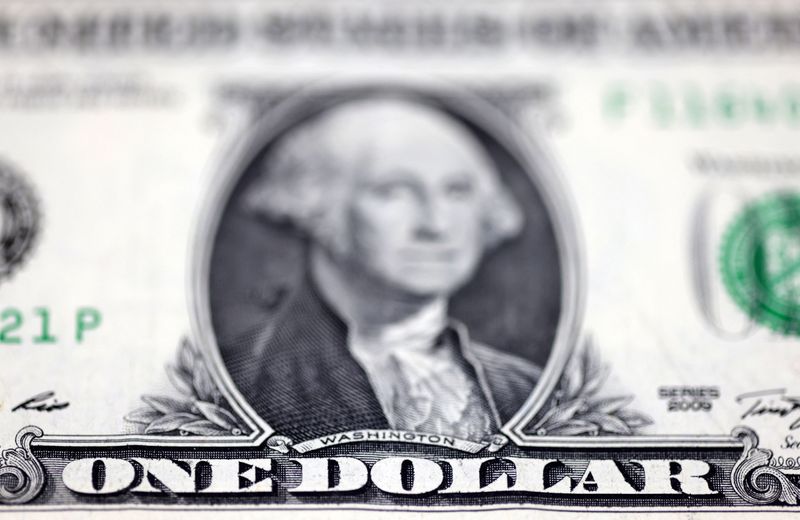By Karen Brettell and Samuel Indyk
NEW YORK/LONDON (Reuters) -The dollar fell to a two-week low against the euro and a more than four-month low against the Japanese yen in a broad based selloff on Thursday, after the Federal Reserve on Wednesday indicated that rate cuts are likely next year.
The euro and pound, meanwhile, were supported by the European Central Bank and the Bank of England affirming the need to hold rates higher for longer.
Fed Chair Jerome Powell said at Wednesday's Federal Open Market Committee (FOMC) meeting that the tightening of monetary policy is likely over, with a discussion of cuts in borrowing costs coming "into view". The Fed's projections implied 75 basis points of cuts next year, from the current level.
"The Fed was very dovish yesterday," said Athanasios Vamvakidis, global head G10 FX strategy at BofA Global Research. “The strong consensus… was for a balanced tone by Powell. Instead, Powell doubled-down, with a very dovish tone."
The dollar index was last at 101.95, down 0.89% on the day. It earlier reached 101.76, the lowest since Aug. 10.
Fed funds futures traders are now almost completely pricing in a 25 basis points cut in March, and 150 basis points in rate reductions by Dec. 2024.
“The market has been coming around to the idea that inflation won’t be sticky or problematic over the past six weeks and now central banks are confirming it,” said Adam Button, chief currency analyst at ForexLive in Toronto.
“The market is running with the idea that rates will return to low levels in time - the bigger picture idea is that we’re headed back to a 2010s era of low growth and low inflation, rather than a 1970s era of volatile inflation,” he said.
The greenback briefly pared losses after data showed that U.S. retail sales unexpectedly rose in November.
The euro gained 1.08% to $1.0991, the highest since Nov. 29. It is on track for its biggest daily percentage gain since Nov. 14.
The ECB kept rates steady and pushed back against bets on imminent cuts to interest rates on Thursday by reaffirming that borrowing costs would remain at record highs despite lower inflation expectations.
“The ECB was unable to “out-dove” yesterday's pivot by the Fed. The ECB continues to signal that rate hikes are done but their updated economic projections show no reason to hurry towards less restrictive policy,” said Samuel Zief, head of global FX strategy at JPMorgan Private Bank in London.
The pound rose 1.11% and earlier reached the highest since Aug. 22 after the Bank of England left interest rates unchanged and said that interest rates needed to stay high for "an extended period". It is also on pace for the best day since Nov. 14.
"The main message remains that rates will remain high for as long as it takes, which effectively is a push-back to market pricing early cuts," said BofA's Vamvakidis.
The greenback fell 0.63% against the Swiss franc and hit the lowest level since July 27 after the Swiss National Bank held rates steady at 1.75%, as expected and acknowledged that inflationary pressure has decreased slightly over the past quarter.
It also tumbled 2.28% against the Norwegian crown to the lowest since August 15 after the Norges Bank unexpectedly raised rates by 25 basis points to 4.5%, adding that they would likely stay at that level for some time. It is looking at the largest drop since Jan. 6.
The yen reached the highest since July 31, with the dollar last down 0.68% against the Japanese currency at 141.94.
Expectations that the Bank of Japan (BOJ) could end negative interest rates at its monetary policy meeting on Dec. 18-19 have largely been dampened, but the BOJ could make tweaks to its statement, such as language that the bank will not hesitate to ease further if necessary, said Masafumi Yamamoto, chief currency strategist at Mizuho Securities.
That kind of change could be regarded as "one step toward normalisation ... so that could be positive for the Japanese yen," he said.
The Australian dollar, meanwhile, hit a more than four-month high at $0.6728 after domestic net employment jumped by 61,500 in November, compared to an increase of around 11,000 that markets had been forecasting. It was last up 0.54% at $0.6696.
The kiwi reached $0.6249, the highest since July 27, despite data showing the New Zealand economy unexpectedly contracted in the third quarter. It was last up 0.52% at $0.6206.
Bitcoin edged up 0.25% to $42,994.
========================================================
Currency bid prices at 3:00PM (2000 GMT)
Description RIC Last U.S. Close Pct Change YTD Pct High Bid Low Bid
Previous Change
Session
Dollar index 101.9500 102.8800 -0.89% -1.488% +102.9100 +101.7600
Euro/Dollar $1.0991 $1.0875 +1.08% +2.58% +$1.1009 +$1.0874
Dollar/Yen 141.9400 142.8950 -0.68% +8.25% +142.8900 +140.9500
Euro/Yen 156.00 155.38 +0.40% +11.19% +156.0500 +153.8800
Dollar/Swiss 0.8661 0.8717 -0.63% -6.33% +0.8731 +0.8632
Sterling/Dollar $1.2756 $1.2618 +1.11% +5.49% +$1.2793 +$1.2614
Dollar/Canadian 1.3410 1.3519 -0.81% -1.03% +1.3514 +1.3395
Aussie/Dollar $0.6696 $0.6661 +0.54% -1.76% +$0.6728 +$0.6657
Euro/Swiss 0.9520 0.9477 +0.45% -3.79% +0.9544 +0.9455
Euro/Sterling 0.8615 0.8617 -0.02% -2.59% +0.8634 +0.8587
NZ $0.6206 $0.6174 +0.52% -2.26% +$0.6249 +$0.6172
Dollar/Dollar
Dollar/Norway 10.5220 10.7800 -2.28% +7.34% +10.7760 +10.4500
Euro/Norway 11.5677 11.7239 -1.33% +10.23% +11.7411 +11.4925

Dollar/Sweden 10.2359 10.3166 +0.28% -1.65% +10.3353 +10.1950
Euro/Sweden 11.2509 11.2193 +0.28% +0.91% +11.2573 +11.1710